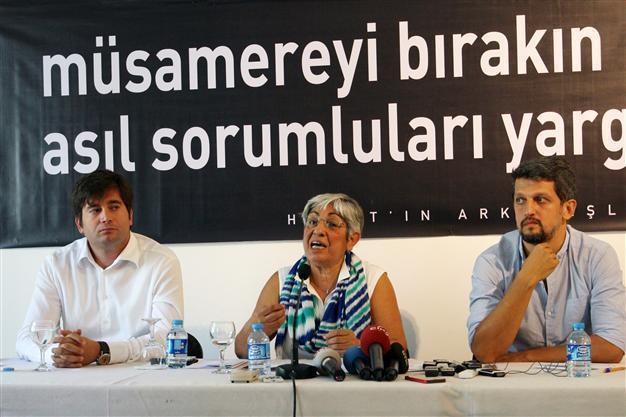Hrant Dink murder case has regressed, lawyer says ahead of retrial
ISTANBUL – Anadolu Agency

Fethiye Çetin speaks (C) during a press conference of the lawyers representing Hrant Dink's family on Sept. 13, ahead of the retrial set to start next week. DHA photo
The case on Hrant Dink’s murder has not advanced but regressed, one of the lawyers representing the Turkish-Armenian journalist said, as the retrial is set to start next week.“We are currently much further behind of the starting point of the trial,” Fethiye Çetin told reporters during a press conference on Sept. 13, arguing that in the initial trial the indictment already defined the organization as “terrorist” while in the retrial, this aspect of the case would be reviewed.
Çetin, who published this month a book about the unknown facts of the case (“Utanç Duyuyorum: Hrant Dink Cinayetinin Yargısı,” “I Feel Ashamed: The Judgment of the Hrant Dink Murder”) explained that the Supreme Court had defined the motive of the organization as “political” rather than “terrorist” in its verdict that led to the retrial of the case.
The Supreme Court of Appeals had overturned the acquittals of top suspects, including Yasin Hayal, who was charged with being the instigator of the assassination and the “leader of a terrorist organization.” Hayal and other suspects such as Erhan Tuncel and Ersin Yolcu will also be retried.
“According to the Supreme Court, this organization was established in 2004 by Yasin Hayal. It comprises Erhan Tuncel, Ersin Yolcu, Ahmet İskender and Ogün Samast, whom they use as the triggerman of the murder. […] However it is defined as only established with a political motive, to punish Hrant Dink,” Çetin said. For a murder to be considered a “terrorist act,” it would have to be committed with a clear aim against the state of the public order, according to the Turkish Penal Code.
“The Supreme Court has made a mistake in its definition of the nature and the aim of the organization,” Çetin said, adding that it could take the court many years of trial to rule on the “terror organization” aspect.
Dink, the renowned editor-in-chief of Agos, was shot in front of his office in Istanbul on Jan. 19, 2007.
Following the convictions of Samast and Hayal for the murder, a high criminal court had dismissed charges related to “armed terrorist organization.” Later, the Supreme Court verdict defined the acts of all suspects in the case under “an organization formed to commit crime” according to the Turkish Penal Code’s Article 220.
Çetin argues in her book that the killing order was given by the Turkish National Intelligence Organization (MİT) via an encrypted message.
















